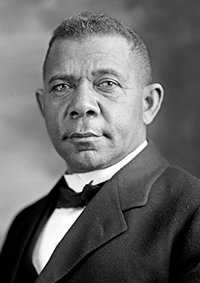Booker Taliaferro Washington (April 5, 1856 – November 14, 1915) was an American educator, author, orator, and the dominant leader in the African-American community between 1890 and 1915. He was born into slavery, the son of Jane, a slave woman, and a white man, in southwestern Virginia. He was raised in West Virginia after emancipation at age 9, taking the surname of his stepfather. He worked his way to and through Hampton University and was appointed head of the Tuskegee Institute, a teacher’s college, in 1881, where he remained for the rest of his life. He became a prominent leader in the African American community and achieved national recognition with his Atlanta Address in 1895, stressing the need for social change through education and entrepreneurship, which came to be known as the Atlanta Compromise. He advocated for change through cooperation with supportive whites through an extensive network of black educators, ministers, editors and businessmen, believing it more effective than confrontation in the South during the Jim Crow era. He had access to leading white politicians, educators and philanthropists, serving as a consultant on race issues and raising funds for the cause. The Rosenwald Fund endowed by Sears CEO Julius Rosenwald alone helped establish 5,000 rural schools for blacks in the South. His autobiography, Up from Slavery, was a best seller and a major influence on the African American community, prompting an invitation from President Roosevelt to become the first black man to dine at the White House in October 1901. |

